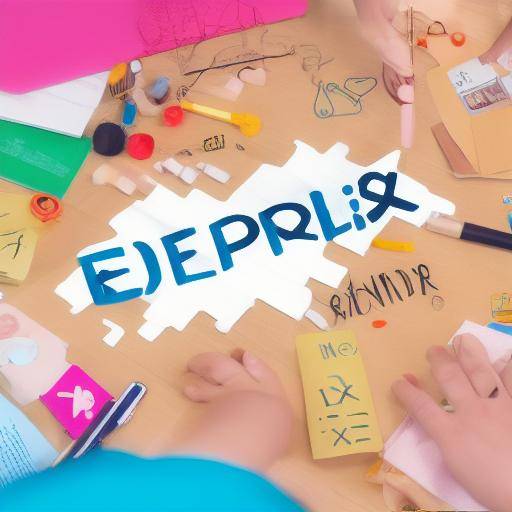
Emotional intelligence is a fundamental component in personal development and ability to manage emotions. Reading, for its part, has shown a significant impact on people's intellectual and emotional development. In this article, we will explore in depth the impact that reading has on improving emotional intelligence, examining its history, benefits, practical applications and future trends. In addition, we will compare and contrast the relationship between emotional intelligence, reading and personal development, providing valuable practical advice and expert reflections in the field.
Introduction
Emotional intelligence, defined as the ability to recognize, understand and manage our own emotions, as well as those of others, plays a crucial role in everyday life. Reading, on the other hand, not only provides knowledge and entertainment, but can also influence the way we perceive and process emotions. Throughout this article, we will explore how reading can enhance emotional intelligence, providing tools and perspectives for meaningful emotional growth.
History and Background
Emotional intelligence has been the subject of study and debate since the 1990s when psychologist Daniel Goleman popularized the concept through his influential book "Emotional Intelligence". This marked a milestone by emphasizing the importance of emotional skills in personal and professional success. Throughout history, various psychological currents, such as the theory of Charles Darwin's emotions or the development of emotional intelligence by Howard Gardner, have contributed to the understanding of this fundamental aspect of human beings.
On the other hand, reading has been a practice rooted in society since the invention of printing, a milestone that allowed the mass diffusion of knowledge and literature. Over time, reading has evolved, adapting to different supports, styles and genres, becoming a powerful tool for learning and reflection. The integration of reading into education has been a fundamental pillar in the cognitive and emotional development of people.
Analysis in Deep
Reading has been associated with multiple benefits for the development of emotional intelligence. By plunging into stories, readers can experience empathy by putting themselves in the place of the characters, understanding their emotional dilemmas and reflecting on the decisions they make. This connection with other emotions fosters compassion and the ability to empathize with others, two central aspects of emotional intelligence.
In addition, reading works that address issues related to personal growth, overcoming emotional challenges or developing meaningful relationships can provide readers with new perspectives and strategies to address their own emotional experiences. By entering a literary world, readers can develop greater self-consciousness by identifying with the characters, analyzing their own emotional reactions and reflecting on their own experiences.
Assiduous reading has also proven to foster emotional intelligence by enhancing emotional self-regulation capacity. By engaging with complex plots and immersive characters, readers can practice control of their own emotions, learning to manage the empathy, anger, sadness or joy that stories evoke to them. This practice of emotional regulation can have a significant impact on daily interactions and decision-making.
The development of social skills is another key aspect that reading can enhance in relation to emotional intelligence. By exploring various interpersonal dynamics through reading, readers have the opportunity to better understand the nuances and challenges of human relationships, thus enriching their emotional intelligence in terms of interaction, effective communication and conflict resolution.
Exhaustive examination
The practical application of reading in the development of emotional intelligence is evident in various contexts. For example, in educational settings, the inclusion of literature that addresses relevant emotional issues can enrich students' emotional education, promoting empathy, emotional awareness and peaceful conflict resolution. Similarly, in the workplace, the reading of literature specialized in leadership skills, effective communication and stress management can contribute to the formation of teams with high emotional intelligence, improving work dynamics and employee satisfaction.
In addition, reading as a tool for the development of emotional intelligence is a practice of self-care and emotional well-being. Dedicating time to reading can provide a space for reflection and disconnection of daily stress, promoting self-reflection and personal growth. This conscious pause in reading can contribute to management and emotional balance in everyday life.
Comparative analysis
By comparing the relationship between emotional intelligence, reading and personal development, it is clear that reading can significantly enhance emotional intelligence, being an invaluable complement to personal growth. While emotional intelligence focuses on understanding and managing emotions, reading offers a way to expand the emotional universe, broadening the perspective and understanding of human emotions.
Reading and personal development are closely interrelated, as reading can offer inspiration, knowledge and practical tools for personal development, thus driving emotional intelligence. In this sense, reading becomes a vehicle to nourish the mind and spirit, enriching human experience and promoting personal flourishing in all its aspects.
Practical Tips and Recommendations
To maximize the positive impact of reading on the development of emotional intelligence, it is recommended:
- Dedicate daily time to reading books that address relevant emotional issues.
- Explore literary genres that offer varied perspectives on human experiences.
- Participate in reading clubs or discussions about books to enrich emotional understanding through dialogue and exchange of ideas.
- Keep a reading journal to reflect on the emotions evoked by the works read and their impact on personal life.
- Find literary recommendations of authors that address emotional issues in a deep and enriching way.
Industry Visions and Expert Reviews
Recognized experts in psychology, education and literature have highlighted the positive influence of reading on emotional intelligence. The clinical psychologist and author Dr. Brené Brown has emphasized the transformative power of reading in the development of emotional empathy and resilience, highlighting that stories can provide courage and understanding to readers on their own emotional journey.
In addition, education experts have emphasized the importance of integrating reading strategies that encourage the development of emotional intelligence in the school curriculum, recognizing the positive impact this can have on the emotional well-being and academic performance of students.
Case Studies and Practical Applications
Numerous case studies support the positive correlation between reading and improving emotional intelligence. For example, therapeutic reading programs have been successfully used in treating emotional disorders, promoting emotional expression and understanding of their own experiences through reading related works.
In the business sphere, reading programs have been implemented as part of the development of soft skills and the promotion of an emotionally intelligent working environment. Employees who participate in book reading and discussion initiatives related to emotional intelligence and leadership have shown greater ability to manage stress situations, effectively communicate and cultivate positive interpersonal relationships in the working environment.
Future Trends and Predictions
As awareness of the importance of emotional intelligence in all spheres of life continues to grow, the integration of reading as a tool to enhance this skill is expected to be strengthened. The arrival of new reading technologies and platforms will provide opportunities to access a diversity of literary content that will address emotional aspects more and more personalized and efficient, thus contributing to the expansion of the positive impact of reading on emotional intelligence.
Conclusion
In short, reading not only drives intellectual development, but also has a profound effect on emotional intelligence. By allowing us to explore other stories, conflicts and emotions, reading enriches our emotional understanding, fosters empathy, promotes emotional self-regulation and expands our repertoire of social skills.
The integration of reading into personal and educational development, supported by the evidence of its positive impact on emotional intelligence, underlines the importance of fostering the reading habit as an integral tool for emotional growth and overall well-being. As a community, we must continue to promote and celebrate the transformative power of reading in improving emotional intelligence, recognizing its invaluable contribution to integral human development.
Frequently asked questions
How can reading contribute to the development of emotional intelligence in children and adolescents?
Reading can provide children and adolescents with a means to safely explore and understand emotions through stories, allowing them to develop empathy, emotional self-regulation and social skills in a natural and meaningful way.
Is there any particular literary genre that is recommended to enhance emotional intelligence through reading?
Literature that addresses emotional issues, moral dilemmas, complex human relationships and personal growth in general is especially conducive to the development of emotional intelligence through reading.
Does reading fiction and nonfiction work have different impacts on emotional intelligence?
Both types of reading can positively impact emotional intelligence. Fiction can foster empathy and emotional understanding, while non-fiction can offer practical knowledge and strategies for personal and emotional development.
How can the reading habit be fostered in educational and work environments with an approach in the development of emotional intelligence?
Integrating reading programs, literary clubs and book discussions that address relevant emotional issues can be an effective strategy in educational and work environments to foster the reading habit with an approach in the development of emotional intelligence.
Can electronic or digital reading have the same impact on the development of emotional intelligence as traditional reading on paper?
While the way reading is accessed may vary, the key lies in the content and process of emotional immersion that reading facilitates, so both electronic and traditional reading can positively influence emotional intelligence.
What is the relationship between emotional intelligence and readership?
Emotional intelligence can enhance reading comprehension by helping readers connect emotionally to content, which in turn can lead to greater empathy and understanding of the emotional complexities of characters and narrative situations.
With this, I hope I have provided a complete vision of the positive influence of reading on the development of emotional intelligence. The integration of reading into everyday life can be a powerful tool to nourish not only the mind, but also the heart, thus contributing to personal and emotional growth.






















































